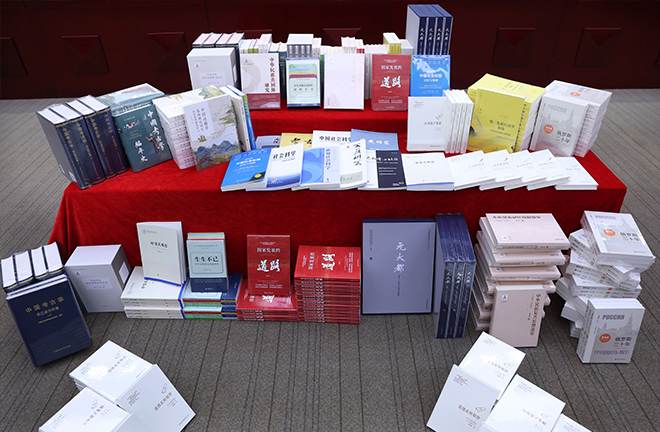CASS releases 22 major research outcomes

Research outcomes unveiled at the conference Photo: Zhu Gaolei/CSST
On Dec. 30, 2024, the Chinese Academy of Social Sciences (CASS) held a press conference in Beijing to unveil 22 major research outcomes under the theme of “Building an Independent Knowledge System for Chinese Philosophy and Social Sciences.”
Addressing the conference, CASS Vice President Zhao Rui emphasized that in 2024, CASS committed to extensive study and implementation of Xi Jinping Thought on Culture, pursued institutional innovation, focused on major theoretical and practical issues, and organized many major research projects. With over 700 projects approved, resulting in more than 10,000 research outcomes, CASS played a proactive and distinct role in building an independent knowledge system for Chinese philosophy and social sciences, achieving tangible results.
The works unveiled at the conference consisted of 14 monographs and eight academic papers. During the event, certain authors and editor representatives shared the research background, innovative perspectives, and academic characteristics of their respective works.
Xia Chuntao, one of the editors-in-chief of Research on Chinese Governance System in Past Dynasties (Volume 1) and director of the Institute of Modern History at CASS, noted that while ancient China experienced corruption, popular uprisings, and social unrest, it also saw periods of effective governance, peace, and social harmony. Despite its ups and downs, the nation advanced overall. Ancient China made notable innovations in institutional design, accumulating extensive governance experience that contributed to its rich civilization. Guided by historical materialism, the book explores ancient statecraft to provide insights for modern national governance.
A Study on the Community for the Chinese Nation elaborates on the great significance of consolidating the sense of community for the Chinese nation, according to its author Wang Yanzhong, director of CASS’s Institute of Ethnology and Anthropology. Through deep analysis of the shared homeland and common identity among various ethnic groups, it demonstrates the inherent mechanism of the Chinese nation’s “unity in diversity” pattern from historical and theoretical perspectives, revealing the intrinsic logic of how the nation formed and developed.
Thirty Years of Russia (1991–2021) offers a comprehensive analysis of Russia’s development over the past three decades, examining its political evolution, economic transformation, and shifts in foreign policy to explore its current status and future trajectory. Sun Zhuangzhi, editor-in-chief of the book and director of the Institute of Russian, Eastern European, and Central Asian Studies at CASS, pointed out that the publication not only provides valuable reference material for Russian studies in China, but also fosters a deeper understanding of Russia, China’s largest neighbor.
The first batch of outcomes of the Classical Studies Series: Classics and Interpretation, Ancient and Modern Compilation encompasses five works of Western and Chinese classics. According to He Fangying, editor-in-chief of the series and a research fellow from the Institute of Foreign Literature at CASS, the outcomes build on the foundation of earlier scholars to establish an editorial and translational framework that equally emphasizes the past and present as well as the classics and their interpretations.
The Book Series on the Prominent Features of Chinese Civilization discusses the five prominent features of Chinese civilization alongside its historical development. Its author representative Liu Feng, a research fellow from the Institute of Philosophy at CASS, explained that many principles of Chinese philosophy reflect the logical structure of these features, embodying a profound civilizational spirit and invaluable intellectual resources.
The General Theory on the Thought of the Rejuvenation of the Chinese Nation (1840–1949) addresses a series of major theoretical issues related to the great rejuvenation of the Chinese nation, including the definition of national rejuvenation, its intellectual trajectory, and the means to achieve it. Zheng Dahua, a research fellow from the Institute of Modern History at CASS and author of the book, stated that the work connects the thought of national rejuvenation with the original aspirations and mission of contemporary Chinese communists and with Chinese modernization. It highlights the historic leap of the Chinese people from standing up to becoming prosperous and ultimately strong under the leadership of the CPC.
Research on Foundational Theories of Chinese Borderland Studies: Centering on Ancient China zooms in on the relationship between “China” and its “borderland” from the perspective of “all under Heaven,” through comprehensive, multidimensional studies of borderland history. The book also analyzes the connection between the institutional culture of “great unity” and the formation and development of China as a multiethnic nation, providing constructive suggestions for advancing Chinese borderland studies in terms of perspective, theory, and methodology. According to Li Dalong, author of the book and copy editor at CASS’s Institute of Chinese Borderland Studies, this book represents an attempt to construct an independent Chinese knowledge system for borderland studies.
A Chronicle of Chinese Archaeology offers a chronological account of major archaeological discoveries and research in China, while also reflecting on and summarizing the centennial history of Chinese archaeology. Drawing on over a century of achievements, the book showcases the depth and longevity of Chinese civilization and underscores the significant contributions of Chinese archaeology to world civilization.
Edited by CHEN MIRONG

 PRINT
PRINT CLOSE
CLOSE